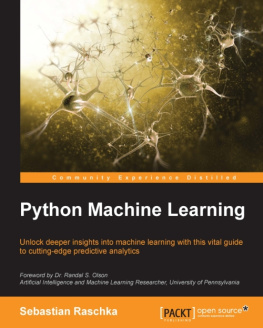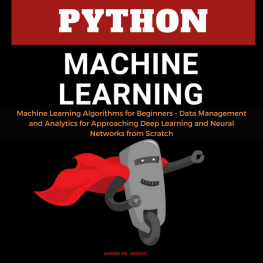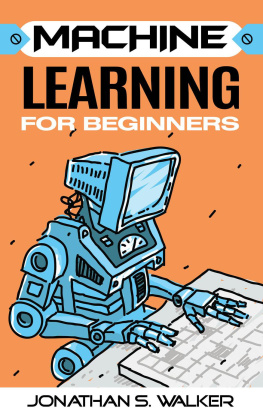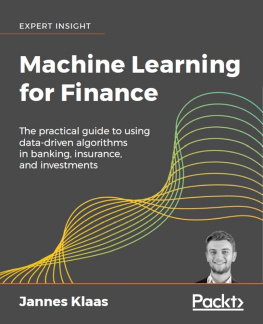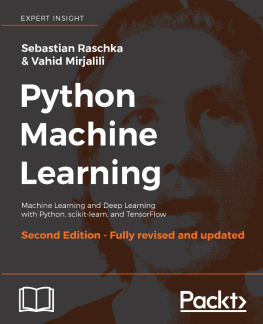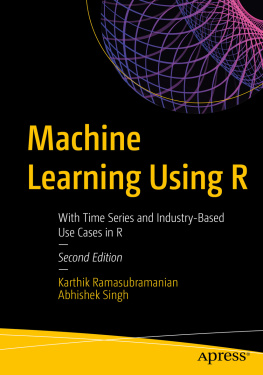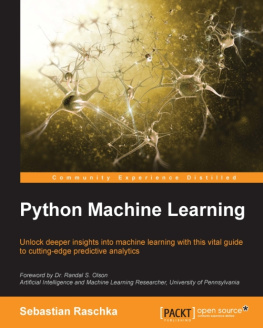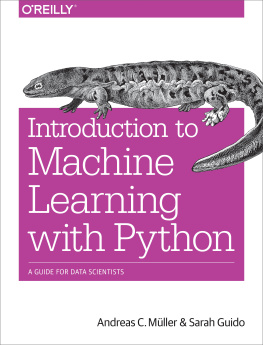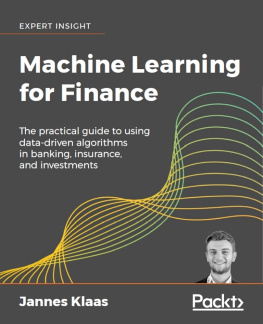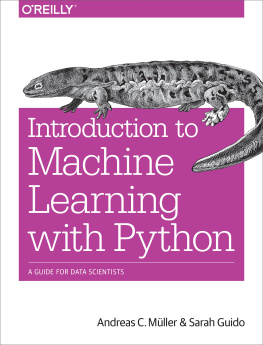Shantanu N. Zagade
Shantanu N. Zagade
Foreword
We live in the midst of a data deluge. According to recent estimates, 2.5 quintillion (1018) bytes of data are generated on a daily basis. This is so much data that over 90 percent of the information that we store nowadays was generated in the past decade alone. Unfortunately, most of this information cannot be used by humans. Either the data is beyond the means of standard analytical methods, or it is simply too vast for our limited minds to even comprehend.
Through Machine Learning, we enable computers to process, learn from, and draw actionable insights out of the otherwise impenetrable walls of big data. From the massive supercomputers that support Google's search engines to the smartphones that we carry in our pockets, we rely on Machine Learning to power most of the world around usoften, without even knowing it.
As modern pioneers in the brave new world of big data, it then behooves us to learn more about Machine Learning. What is Machine Learning and how does it work? How can I use Machine Learning to take a glimpse into the unknown, power my business, or just find out what the Internet at large thinks about my favorite movie? All of this and more will be covered in the following chapters authored by my good friend and colleague, Sebastian Raschka.
When away from taming my otherwise irascible pet dog, Sebastian has tirelessly devoted his free time to the open source Machine Learning community. Over the past several years, Sebastian has developed dozens of popular tutorials that cover topics in Machine Learning and data visualization in Python. He has also developed and contributed to several open source Python packages, several of which are now part of the core Python Machine Learning workflow.
Owing to his vast expertise in this field, I am confident that Sebastian's insights into the world of Machine Learning in Python will be invaluable to users of all experience levels. I wholeheartedly recommend this book to anyone looking to gain a broader and more practical understanding of Machine Learning.
Dr. Randal S. Olson
Artificial Intelligence and Machine Learning Researcher, University of Pennsylvania
About the Author
Sebastian Raschka is a PhD student at Michigan State University, who develops new computational methods in the field of computational biology. He has been ranked as the number one most influential data scientist on GitHub by Analytics Vidhya. He has many years of experience with coding in Python and he has conducted several seminars on the practical applications of data science and machine learning. Talking and writing about data science, machine learning, and Python really motivated Sebastian to write this book in order to help people develop data-driven solutions without necessarily needing to have a machine learning background.
He has also actively contributed to open source projects and methods that he implemented, which are now successfully used in machine learning competitions, such as Kaggle. In his free time, he works on models for sports predictions, and if he is not in front of the computer, he enjoys playing sports.
I would like to thank my professors, Arun Ross and Pang-Ning Tan, and many others who inspired me and kindled my great interest in pattern classification, machine learning, and data mining.
I would like to take this opportunity to thank the great Python community and developers of open source packages who helped me create the perfect environment for scientific research and data science.
A special thanks goes to the core developers of scikit-learn. As a contributor to this project, I had the pleasure to work with great people, who are not only very knowledgeable when it comes to machine learning, but are also excellent programmers.
Lastly, I want to thank you all for showing an interest in this book, and I sincerely hope that I can pass on my enthusiasm to join the great Python and machine learning communities.
About the Reviewers
Richard Dutton started programming the ZX Spectrum when he was 8 years old and his obsession carried him through a confusing array of technologies and roles in the fields of technology and finance.
He has worked with Microsoft, and as a Director at Barclays, his current obsession is a mashup of Python, machine learning, and block chain.
If he's not in front of a computer, he can be found in the gym or at home with a glass of wine while he looks at his iPhone. He calls this balance.
Dave Julian is an IT consultant and teacher with over 15 years of experience. He has worked as a technician, project manager, programmer, and web developer. His current projects include developing a crop analysis tool as part of integrated pest management strategies in greenhouses. He has a strong interest in the intersection of biology and technology with a belief that smart machines can help solve the world's most important problems.
Vahid Mirjalili received his PhD in mechanical engineering from Michigan State University, where he developed novel techniques for protein structure refinement using molecular dynamics simulations. Combining his knowledge from the fields of statistics, data mining, and physics he developed powerful data-driven approaches that helped him and his research group to win two recent worldwide competitions for protein structure prediction and refinement, CASP, in 2012 and 2014.
While working on his doctorate degree, he decided to join the Computer Science and Engineering Department at Michigan State University to specialize in the field of machine learning. His current research projects involve the development of unsupervised machine learning algorithms for the mining of massive datasets. He is also a passionate Python programmer and shares his implementations of clustering algorithms on his personal website at http://vahidmirjalili.com.

